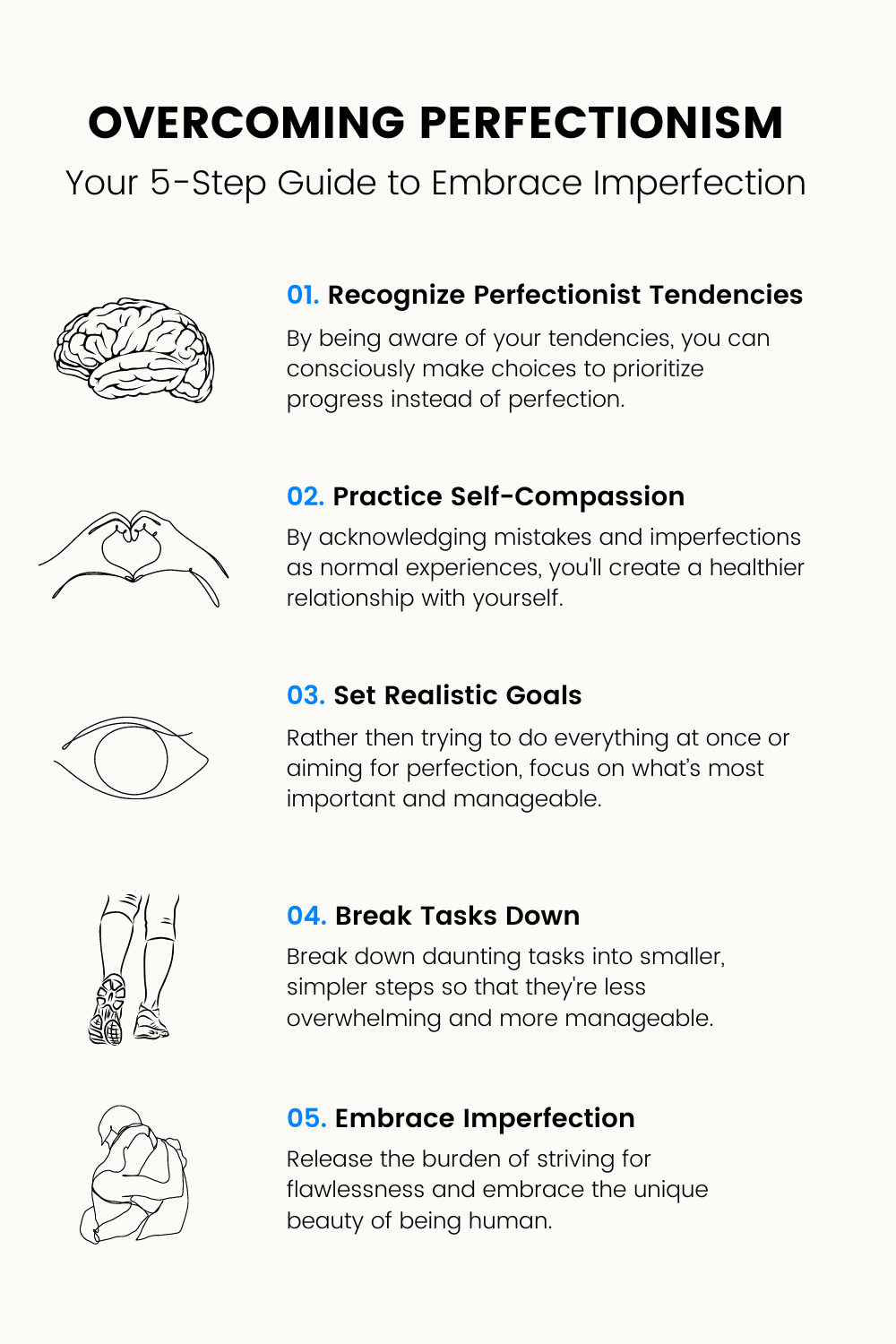Perfectionism can be the force behind motivation. However, keeping up with being perfect all the time causes stress and even burnout. Many perfectionists, like myself, struggle to keep to-do lists manageable. The urge to perfect my lists causes me to spend more time carefully crafting them than actually completing the tasks. If anyone else relates to this urge,, don’t worry, because I am going to share what worked in overcoming my perfectionism. This guide will go into the causes of perfectionism, its impact on productivity, and will provide strategies on how to overcome compulsion to be perfect when creating to-do lists.
Understanding Perfectionism
As someone who has grappled with perfectionism, I understand the constant pursuit of flawlessness and the associated challenges. Perfectionism often manifests in various aspects of life, from academics to personal relationships. For instance, in my academic journey, I would invest countless hours refining and polishing my essays, obsessively striving for flawlessness. Moreover, even in my personal life, I found myself curating my social media profiles to project an idealized image of myself, relentlessly aiming for that elusive state of flawlessness. It can create immense pressure, hinder progress, and lead to self-criticism and burnout. Embracing imperfections and accepting that mistakes are an integral part of growth has been a valuable lesson in my quest to overcome perfectionism.
Perfectionism Can Negatively Impact Productivity
Perfectionism has definitely taken a toll on my productivity. The constant need to achieve flawless results can create a paralyzing fear of making mistakes or falling short of impossibly high standards. This fear causes me to procrastinate as I often wait for the”perfect” moment or idea to strike before taking action. The irony is that this pursuit of perfection actually hampers productivity rather than enhancing it. Countless hours are spent on minute details, endlessly editing and revising instead of making progress. The quest for flawlessness can become a vicious cycle, draining both time and energy. Realizing how much perfectionism was hindering my productivity has been a wake-up call. It prompted me to make a conscious shift in my mindset, opting for a more balanced and realistic approach. Instead of fixating solely on flawless outcomes, I’ve learned to embrace growth and learning. I am now more comfortable allowing myself to make mistakes because they are a learning opportunity. By adopting this mindset, I’ve found a greater sense of fulfillment and a renewed motivation to keep moving forward.
Overcoming Perfectionism
The good news is that perfectionists can learn to overcome this trait and develop healthier habits that will increase productivity and well-being. Here are some tips that helped me with overcoming perfectionism:
- Recognize Perfectionist Tendencies: Recognizing my perfectionist tendencies is the first step toward overcoming the grip of perfectionism. One way to identify my tendencies is to pay attention to my thought patterns and behaviors. For example, when I catch myself spending countless hours perfecting a small detail on an assignment instead of completing it, that can be a clear sign of perfectionism hindering my ability to finish a task. Similarly, if I feel intense anxiety or fear of failure when facing a challenge, it’s worth examining whether perfectionism is driving those emotions. By acknowledging these patterns, I gain the power to challenge them and make conscious choices that prioritize progress over perfection.
- Practice Self-Compassion: Practicing self-compassion holds immense power in overcoming perfectionism. By showing myself kindness and understanding, I open up a space for personal growth and self-acceptance to flourish. For example, when I encounter mistakes or setbacks, practicing self-compassion enables me to respond with patience and encouragement instead of resorting to harsh self-criticism. This mindset shift allows me to acknowledge that imperfections are integral to my shared human experience, fostering resilience and cultivating a healthier relationship with myself.
- Set Realistic Goals: When setting goals, it’s important to be realistic and set achievable targets. Rather than trying to do everything at once or aiming for perfection, I need to focus on what’s most important and manageable. This helps me achieve more tasks and prevent burnout.
- Prioritize Tasks: Prioritizing tasks is a valuable approach for overcoming perfectionism. By identifying and focusing on the most important tasks, I can avoid getting overwhelmed by the need for perfection in every aspect. Using a planner can be particularly helpful in this regard. For instance, when setting realistic goals, I can utilize the My Day feature on the Any.do app to prioritize tasks based on their significance and deadlines. This allows me to concentrate my energy on the essential tasks, making progress without succumbing to the perfectionist trap. It’s about finding a balance and giving myself permission to prioritize what truly matters.
- Break Tasks Down: Perfectionists often struggle with breaking down large projects into smaller, more manageable tasks. To avoid being overwhelmed, I can use the Calendar program from Any.do to plan out when I need to complete manageable tasks in order to still reach my end goal. For example, when I have a big writing assignment due, instead of writing it all in one night, I instead break it up throughout the week and write a few pages per day. This method has helped me stay focused on completing big assignments in a timely manner.
- Embrace Imperfection: Embracing my imperfections is crucial in conquering perfectionism. Rather than endlessly chasing an unattainable ideal, I shift my focus to progress, personal growth, and self-acceptance. It’s through my imperfections that I truly learn, develop, and discover my authentic self. Release the burden of striving for flawlessness and embrace the unique beauty of being human.
- Set Boundaries: Perfectionists often struggle with setting boundaries and saying no to tasks or projects that don’t align with their priorities. To avoid burnout and overwhelm, I can learn to say no when necessary and prioritize my time and energy.
Creating an Effective To-Do List
Once I’ve learned to overcome perfectionism, the next step is to create an effective to-do list. An effective to-do list should be simple, realistic and prioritizes my most important tasks. These tips help me make a to-do list effective:
- Keep it Light: Do not over-complicate my to-do lists by adding too many tasks. I have to be aware of when I am overcrowding my to-do lists and make sure that I can realistically complete all my to-dos. I keep my lists simple and focused on my most important tasks.
- Prioritize Tasks: Use a system like Any.do’s to-do lists to prioritize my tasks based on their urgency and importance. This will help me focus the most critical tasks first before I focus on things that rank less important.
- Use Clear and Specific Language: When creating my to-do list use clear and specific language when describing each task. This will prevent me from being confused about my own tasks.
- Break Tasks Down: As mentioned earlier, breaking down large projects into smaller, more manageable tasks builds momentum and promotes focus. When creating my to-do lists, break down my large tasks into manageable ones to make them seem less daunting.
- Use Deadlines: Assigning deadlines for tasks can help layout what needs to be completed first. When assigning deadlinestake into account how much time each task may take. Be realistic in how many tasks can be completed in one day
- Review and Revise: Review to-do lists regularly and revise it as necessary. Do not be afraid to revise tasks as needed.
Embrace the Power of Imperfection
While perfectionism can seem like an admirable trait, it’s important to recognize that embracing imperfection can actually lead to greater success and productivity in the long run.
All it takes is a few easy steps- setting attainable goals, prioritizing important tasks, and practicing self-compassion. Celebrating progress instead of perfection is the key to success!
When it comes to my to-do list, I don’t overcomplicate things. Keep it simple, use clear and specific language, set deadlines, and review and revise regularly. And don’t forget to prioritize tasks based on their importance and urgency.
With these tips, I have an easier time completing tasks and becoming successful in combating my perfectionism! Just keep pushing forward and remember that small steps lead to big changes!




